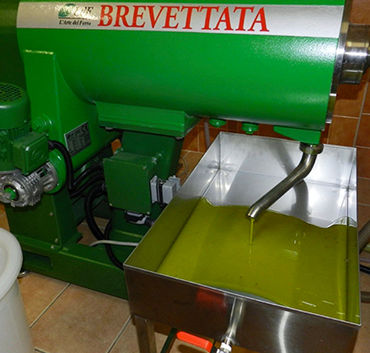

Keeping temperatures low, combined with the phytonutrient-rich first pressing of the oil, provides the strongest possible nutrient composition from an extracted extra virgin olive oil. To guarantee a top quality oil, DORA uses its own cutting-edge oil-mill: technology and materials combine in this professional, albeit small, plant. Its two-phase system produces oil without the use of a vertical centrifugal separator. One of the plant exclusive features is the absence of water consumption. This, together with the absence of a final second separator, means it has a low environmental impact; furthermore, by avoiding another stressful processing phase for the oil, it also preserves its organoleptic qualities. The mill is fully computerised, software regulates all of the machines' parameters (including the temperature) and checks all the values. This is what allows us to undertake an authentic cold extraction.
Organoleptic assessment, nutritional values and HACCP
To evaluate its quality, oil is subjected to a sensory analysis that follows a strict tasting protocol for detecting, identifying and quantifying the many positive and negative attributes of extra virgin olive oil.
DORA farm’s staff has sector-specific qualifications, not least of which is the formal recognition as extra virgin olive oil tester (according to COI-T20 regulation), thus we always assess the organoleptic properties of the oil as soon as it is milled, evaluating its quality.
Finally, the farm follows the HACCP (Hazard Analysis and Critical Control Points) system and records all nutrition data resulting from laboratory tests on its product labels.
Storage and Packaging
Use of correct storage techniques for extra virgin olive oil is a must if its delicate taste has to be preserved, and ensure it does not become rancid. Air, heat and light are the natural enemies of olive oil.
Our extra virgin olive oil is stored in stainless steel containers in a cool, dark and dry room, at a temperature of between 6°-15° C.
All the bottles are filled, corked, labelled and assembled by hand at the farm when we receive an order, with the utmost care and attention to every detail!
At Dora we control every stage of the production cycle, from harvest to bottle. Everything takes place on the farm, from harvest to milling to bottling and packaging. Our eco-friendly procedures are designed to guarantee extremely high standards and a final product of the best quality.
We only use renewable energy, which we produce with solar panels, and we recycle all the residues from the olive processing phase as biomass for our central heating system and fertiliser in the olive orchard…
DORA really is an open air workshop of sustainability!
The Harvest
Harvest time usually begins in mid-October and lasts until mid-November, olives are harvested by hand, and collected in nets placed around the foot of the tree.
The utmost care must be taken in harvesting and storing olives before they are pressed, protecting them from bruising.
We try to ensure that the amount of time between harvest and extraction is as little as 5 hours.
The Processing Phase
Once the harvested olives reach the olive mill, they are passed over a vibrating belt to separate them from any remaining leaves and twigs.
It is important that there is no delay in extracting the oil from the olives, as the fruit can start to oxidise and ferment, damaging the quality of the oil.
Production methods, especially at pressing stage, really do make a difference, with an impact of 80% on quality and health benefits of the final product. Cold pressed means that minimal heating is used when mechanically processing the olives to make the oil.
